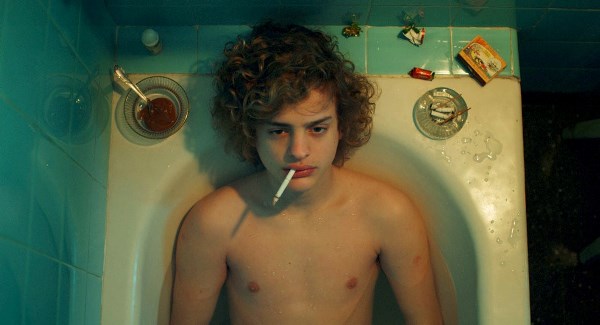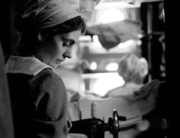This occasionally subversive crime drama and character study is based on a real-life Argentine serial killer nicknamed “The Angel of Death,” whose youth and fresh-faced good looks earned him notoriety, and whom police apprehended in Buenos Aires in 1971. Actor Lorenzo Ferro embodies the part, exuding natural charisma as Robledo “Carlitos” Puch, already an experienced teenage cat burglar when the film begins. However, there is more to his crimes than mere opportunism. After sneaking into a large, well-furnished house in the very first scene, he puts on a record and starts dancing around.
Carlitos is the child of working-class, conservative parents who frown upon the treasures he occasionally brings home, and so he gives them away to others to curry favor. One such recipient is Ramón (Chino Darín), a high school classmate whom Carlitos initially befriends by picking a fight. After giving him a stolen item as part of an apology, Ramón brings him home to meet his family, including his father, José (Daniel Fanego), an ex-convict whom Carlitos bonds with while shooting pistols in his den. The three make plans to commit some heists together, with José recognizing real talent in the youth.
Between José and Ramón’s mother, Ana Maria (Mercedes Morán), Carlitos now has surrogate parents who are far more supportive of his passions than his folks. But rather than play with that dynamic, director Luis Ortega and his screenwriters are much more interested in the sexual tension between Carlitos and Ramon, of which both of them seem aware, although neither brings himself to address it. Yet it is these powerful feelings that prompt Carlitos to act impulsively at times, including an incident that doubles as one of more shocking acts of violence in the film.
For a time, Carlitos leads an idyllic existence that involves carrying out heists with Ramón, during which they banter and occasionally stare soulfully into each other’s eyes. At times Carlitos’s desire to improvise in the midst of a break-in causes friction with Ramón, who just wants to follow the plan and get out. But for the most part, the film views them as having complementary personalities. That especially comes across when Ramón tries to pursue a show business career against his parents’ wishes, and Carlitos, who, of course, understands what it means to rebel against one’s kin, is the only one to encourage him. Unfortunately, that also opens him up to the possibility of losing Ramón, which leads to more questionable decision-making.
The fact that El Angel mostly works is due in large part to Ferro as Carlitos, as the actor helps make the character intentionally likeable even when he commits horrible crimes. Ortega utilizes a lot of close-ups that put Ferro’s smoldering good looks, slightly crooked smile, and mildly tousled hair front and center—in effect, letting him charm the audience in the same way Carlitos affects those around him. It also helps that despite being a cold-blooded killer, the protagonist has moments in which he shows unwavering loyalty, in contrast to the cliché about no honor among thieves. The only time he fails at this involves a split-second decision, but in a close-up of Carlitos’s face, we sense how conflicted he is about his choice.
The filmmakers tell their story at a fast clip, making good use of classic ’70s rock and psychedelia to maintain a relentless vibe. In addition, the art direction is full of garish colors, which seemingly reflect the intense emotions swimming beneath the characters’ surfaces. If I had any complaint, it’s that the relationship between Carlitos and Ramón is so essential that after a sudden development sidelines it, the film staggers more than glides to its finish. Indeed, once the focus falls strictly on Carlitos, neither he nor El Angel have much in the way of options, though both look good.







Leave A Comment